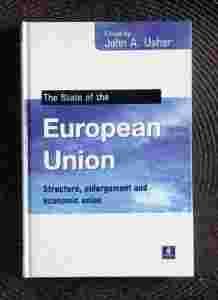|
STATE OF THE EUROPEAN UNION
Structure enlargement and economic union
This book provides an overall review of the position of the European Union at a critical time in its evolution, taking full account of the Treaty of Amsterdam, negotiations relating to the enlargement of the EU, and the reality of monetary union. The focus of the book is predominantly but not exclusively legal, and the interdisciplinary approach will ensure it is of interest to a broader constituency than just lawyers. The book is based on the revised papers presented at the Thirtieth Anniversary Conference of the Europa Institute examining the State of the European Union.
The book starts with overviews of the European Union from internal and external perspectives. Internally, there are contributions on flexibility and the long-established concept of direct effect. Externally, there is an examination of both the framework of the common foreign and security policy and an analysis of the challenge to eastward enlargement of the EU in the shape of the common agricultural policy.
The next part of the book considers the social and environmental features of the Treaty. It includes an analysis of the pervasive issue of environmental protection, discussion of the new employment chapter and social provisions, and a critique of the "European Social Model".
The establishment of the Scottish Parliament in effect underlies the two chapters concerned with problems of implementation: the first of these examining domestic implementation in the context of devolution, the second giving a German perspective on implementation problems in a federal system.
The next two chapters consider cooperation between Member States outside the Community framework. The first of these examines the use of Conventions in the area of private international law; the second focuses on the criminal law aspects of the Third Pillar.
The concluding part of the book examines economic issues: the role of the EU in the international trading system, and both an economic and legal analysis of the development and impact of economic and monetary union.
John Usher is Salvesen Professor of European Institutions at the Europa Institute, University of Edinburgh, Honorary Jean Monnet Professor of European Law and Director of the University's Europa Institute. He has written extensively on European law and has lectured widely throughout the European Union.
|

